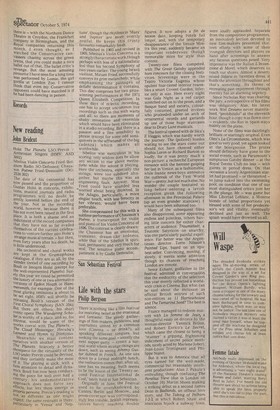Records
New reading
John Bridcut
Hoist The Planets LSO/Previn / Ambrosian Singers (HMV; ASD 3002)
Sibelius Violin Concerto Fried/Belgium Radio SO/Defossez; Chausson Poerne Fried/Demoulin (DG: 2538302)
The date of his centennial has how passed and the proportion of Gustav Hoist in concerts, exhibitions, musical journals and radio Programmes will no doubt be gently lowered before the end of the year, Not in the recording world, however, because there it has not even been raised in the first Place. It is both a shame and an indictment of the record companies that they have not so far availed themselves of the current celebrations to venture further into Hoist's strange musical terrain but then, even forty years after his death, he is little understood.
His orchestral and choral works are kept in the Gramophone catalogue, if they are at all, by the slender thread of one recording by Boult or Imogen Hoist (except for the well-represented Planets). Surely this year we could be permitted the luxury of one or two alternative versions of Egdon Heath or Hammersmith, for example. One of the most glaring omissions is about to be set right: HMV will shortly be releasing Boult's version of the First Choral Symphony (SAN 354). SUL there are others; his short comic opera The Wandering Scholar is worthy of a place, and so, for interest, would be some of the Works coeval with The Planets The Cloud Messenger, Hecuba's Lafrient and Hymn to Dionysus. Meanwhile we must content ourselves with another version of The Planets. Scarcely a better showpiece for the virtuosity of the LSO under Previn could be devised, and they certainly make the most of it. The playing is slick, with a firm attention to detail and dynarnics. Boult has now been conducting the piece for well over half a century; his undemonstrative approach does not force any effects, but lets them emerge in Propria persona. Previn's reading is not as different as one might eXPect: the same restraint is there, Particularly in 'Venus' and 'Nep
tune', though the rhythms in 'Mars' and 'Jupiter' are more overtly zestful. He keeps this crusty favourite remarkably fresh.
Published in 1903 and revised in 1905, Sibelius's Violin Concerto is a stronglycharacteristicwork,though perhaps with less of a nationalistic feel than his Second Symphony of two years earlier, The young Israeli violinist, Miriam Fried, successfully conveys its grim melancholy, while emphasising the passages of defiant determination it Contains. This disc comprises her two prizewinning performances at the 1971 Queen Elizabeth Competition. In these days of eclectic recording, one has to accept uncommon live recordings such as this with warts and all; so there are moments of shaky intonation and ensemble which would have been eliminated in a studio recording. But there is a passion and a fine sensibility to phrase (except for some odd semiquavers in the affretandi of the big cadenza) Which makes all worthwhile.
Sibelius was meticulous in his scoring: only seldom does he allow any section to rise above mezzoforte while the soloist is playing. Here the orchestra, especially the strings, were too subdued altogether, but maybe this was an engineering fault. Anyway, Miss Fried could have sounded less -worried about being drowned. In the Adagio, particularly, a more elegiac touch, with less ferocity in her vibrato, would have been preferable. She compensated for this with a sublime performance of Chausson's Poeme, a transcription for violin and piano of his Violin Concerto of 1896. The contrast is clearly drawn: the Chausson has an emotional, transient, dream-like sadness, while that of the Sibelius is spiritual, permanent and very much for real. The sensitive piano accompaniment is by Gisele Demoulin.
































 Previous page
Previous page